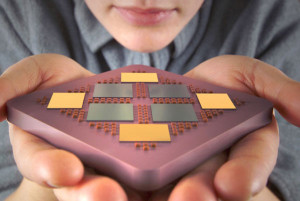IBM said Tuesday that it will begin licensing its Power chips to other companies, pursuing a direction that companies like ARM have followed with great success.
IBM also said that it would form the OpenPower Consortium, a collection of companies that includes Google, Nvidia, and Mellanox; that consortium will form an ecosystem of hardware and software developers to drive innovation in cloud computing, said Tom Rosamilia, the senior vice president of IBM’s Systems and Technology Group, in a blog post.
While consumers typically buy a graphics card or PC with a microprocessor inside, manufacturers like Intel, which makes its own chips, are a comparative rarity. Instead, companies like Nvidia send their designs to merchant foundries, such as Taiwan Semiconductor Manufacturing Co., to perform the manufacturing for them. Companies like ARM abstract the process a step further: ARM, whose products power the vast majority of the world’s smartphones, doesn’t actually make any of its chips itself. Instead, it licenses its microprocessor designs to companies like Apple, Qualcomm, and Nvidia, which sign agreements that let them add their own logic blocks to the ARM design and build them at a foundry of their choosing.
It’s the latter camp that IBM will fall into, licensing the Power architecture under the OpenPower umbrella. IBM previously licensed Power chips from Power.org, just not server-class chips, microprocessor analyst Kevin Krewell noted.
“Under the OpenPower initiative, IBM will license the core intellectual property for our Power technologies to other companies for use in designing servers employed in cloud data centers,” Rosamilia wrote. “Up until now, IBM primarily used the Power design in its own servers. This new initiative makes it possible for cloud services and their technology providers to redesign the chips and circuit boards where computing is done–optimizing the interactions of microprocessors, memory, networking, data storage and other components. As a result, they can get servers that are custom-tuned for their applications.”
The problem that IBM has faced is that RISC-based microprocessors like the Power architecture live in a world increasingly powered by “commodity” servers powered by the Intel Xeon architecture. IBM holds a more than 50 percent share of the Unix market in which its Power servers play, but that segment fell 35.9 percent to $1.5 billion during the second quarter, according to market research firm IDC. Meanwhile, second-quarter X86 server revenue totaled $8.3 billion.
In February, IBM announced several new Power servers priced at about $7000, putting them in line with Xeon server prices. And Power is also behind high-profile initiatives like “Watson,” which combines natural language with powerful database processing to “understand” questions, such as those found on Jeopardy. But IBM apparently felt like it had to go further.
IBM pledged that its licensing would be “open,” revealing both the design of the chip and the software that goes with it to its licensees. So far, no other company has announced plans to sign a Power license, although the first members of the OpenPower Consortium–Google, Nvidia, board and server maker Tyan, and networking company Mellanox–would be likely candidates.
“Why would a cloud service provider want to design its own servers?” Rosamilia wrote. “The answer comes down to differentiation and economics. In this highly competitive technology marketplace, companies want to be able to provide capabilities such as big data analytics and targeted advertising at the highest performance levels and at the most competitive prices.”
That strategy, in fact, has been embraced by Facebook, whose own Open Compute Project has developed reference designs for Xeon-based servers that OCP members have published to the Web. However, Google, which has also built servers for its own internal use, has so far declined to the join the OCP.





